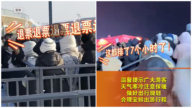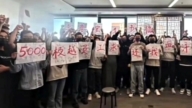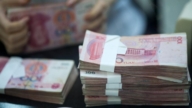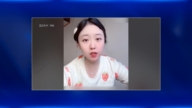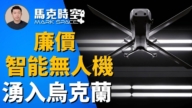【新唐人2011年4月16日讯】大陆国家统计局最近发布3月份经济资料。虽然在此之前当局通过行政干预,不断加强物价调控力度,但3月份的居民消费物价指数(CPI)同比增长仍然高达5.4%,超过预期,创下32个月以来的最大涨幅。学者指出,当局用行政手段去控制物价上涨的做法不可取,价格管制并不利于发展。
大陆统计局于本周五(4月15号)发布的经济资料显示,中国3月份的通胀率为5.4%,创下了2008年以来的最大涨幅。其中,食品价格上涨仍然是通胀飙升的主要因素。
《网易》刊载了这一消息后,立即引来网民的热议,短短几个小时之内,就有近4万人参与讨论。很多网民对这一资料的真实性表示质疑,认为实际通胀远不止于此。
资料显示,今年(2011年)第一季度大陆居民消费价格同比上涨5.0%。其中,食品上涨11.0%,居住上涨6.5%。
《法国国际广播电台》报导,德意志银行大中华区首席经济学家马骏预料,中国通胀压力会持续,6月份通胀率可能升到6%的全年高位。
中国对外经济贸易大学国际投资研究室主任李长安在微博上表示,资料显示当前的通胀形势比较严峻,当局将会再次加息和上调存款准备金率。
虽然大陆央行自去年10月至今已经4度加息,但对调控通胀的效用十分有限。金融巨鳄索罗斯(George Soros)在日前的一个会议上表示,中共错失了采用人民币升值降低通胀的机会,中国的通胀有些失控。
而随着通胀形势的日益严峻,当局使用了越来越多的行政手段来干预物价。大陆发改委更是在近期,组织全国17家行业协会的负责人开会,要求各行业协会“不许涨价”。
中国经济学者李华芳向《自由亚洲电台》表示,当局这种通过行政手段去控制物价上涨的做法不可取。
李华芳:“它(当局)所追求的是短期的效果,而且他也比较追求表面上的效果,如果说行政手段能在极短的时间抑制物价,但物价会随着运动式的干预方式放手之后就会立即反弹,之前没有通过行政的方式,让市场自我去调节的话,这个价格的波动可能是比较小的。”
大陆发改委在压制各行业涨价需求的同时,却于近期上调成品油价,而且准备在部分地区,调高电价,这自然引来一片质疑。
《华尔街日报》专栏作家崔宇指出,当局这是厚此薄彼。一方面,不让产业链中下游的市场化企业涨价﹔另一方面,却让政府的垄断企业涨价。他认为,这是在开倒车,这样的价格管制并不利于发展。
他强调,如果发改委试图以一己之力,通过行政干预将上下游价格一起摀住,重新扮演“国家计委”的角色,那更加令人担忧。
北京经济学家刘正山认为,问题的核心在于当局制造的“货币大放水”和低利率。不解决核心问题,政府的物价调控措施只能收到“摁压葫芦”的效果——它们被摁压之后最终会争相浮出水面。
新唐人记者李谦、王明宇综合报导。
***********************
March Infliatiion Still High in China
Economic data from recent bureau of statistics
showed that the consumer price index (CPI) in March
is higher than expected, up by 5.4% year to year,
the largest increase in the past 32 months, disregarding
authorities continue to strengthen efforts to control
price increase. Scholars pointed out that using
administrative means to control price increase
is conducive to development.
On Friday April 15, economic data released by bureau
of statistics indicated that China’s March inflation rate
was 5.4%, marking the largest increase since 2008.
Among them, food-price soaring is still a major factor.
After EaseNet published this news, it attracted heated
discussions within hours among 40,000 netizens.
Many of them questioned the authenticity of this news
and believed that the actual inflation was much higher.
Statistics show that in 2011, the CPI rose 5% in
the first quarter for mainland residents. Among them,
food prices rose 11.0% and housing rose 6.5%.
Radio France Internationale reported that Ma Jun,
chief economist for Greater China at Deutsche Bank
predicted that the pressure will continue, and in June
inflation rate may rise to 6% of the annual high.
Li Changan, director of China Foreign Economic and
Trade Research Office said in his Micro-blog that
the current inflation situation is fairly severe, it will again
raise interest rates and adjust the deposit reserve ratio.
Although the Central Bank in China had raised
interest rates 4 times since last October,
but it brought limited result. In a recent meeting,
financial Guru George Soros said that China lost
an opportunity to control inflation when it failed
to act on RMB appreciation.
With inflation is getting worse, authorities have used
more administrative measures to interfere with prices.
Recently, Development and Reform Commission
gathered leaders from 17 industry associations
and requested them not to “ increase price”.
Economist Li Huafang told Radio Free Asia, “Using
administrative means to control price is not smart.”.
Lihua Fang:"What authorities wanted is only a
short-term effect. It illustrated the superficial
result: if price can be controlled within a very
short time by administrative means,
it will soon rebound after the intervention stops.
If we allow it to self-regulate without manipulation,
the price fluctuation will be relatively small.”
While suppressing prices of various industries, recently
Development and Reform Commission also tried to
control refined oil prices and increased electric prices
in some areas, which raised suspicions.
Wall Street Journal columnist Cui Yu pointed out that
this is unfair treatment. To prevent smaller enterprises
from price increases, but allow the state-run
enterprises to monopolize the market. He believes
that price control is conducive to development.
He stressed: “It is more worrisome if Development
and Reform Commission attempts to play the role of
‘the state planning commission’, and single-handedly
control prices through administrative means.”
Beijing economist Liu ZhengShan believed that
“monetary policy” and “low interest rate” from
the authorities had not solved the core problems.
Using administrative means to control prices is like
“pressed down gourd”, which will float back to
the surface in the end.
NTD reporters Liqian and Wang Mingyu




